
The following essay by Hope S. Rugo, MD, is adapted from The Big Casino: America’s Best Cancer Doctors Share Their Most Powerful Stories, which was coedited by Stan Winokur, MD, and Vincent Coppola and published in May 2014. The book is available on Amazon.com and thebigcasino.org.
I was in medical school when my mother was diagnosed with breast cancer. Although, as a second-year student, I didn’t know anything about the disease, I knew enough to be scared. I was the only daughter in my family, and my mother was my best friend. We were told it was a small cancer, and they’d “gotten it all,” after only a mastectomy without reconstruction was offered. All she needed was adjuvant radiation therapy, which burned the skin on her back and chest but otherwise left no memory of the disease.
Eleven years later, I was pregnant with my first child and a faculty member specializing in malignant hematology when my mother called saying her chronic back pain was much worse. I sent her off for a magnetic resonance imaging (MRI), thinking she might need surgery for a problem with a disk, only to find that her bones were riddled with cancer.
My mother’s parents both died of cancer, and the disease held an inevitability of pain and loss that I grew up with. The diagnosis was at first overwhelming but quickly led us to focus on making our future plans happen now. We found an apartment around the corner from my house in San Francisco, and my mother moved in. I found a colleague who could take over her care. She loved our neighborhood, got to know the merchants, decorated her small flat, and adored her first grandchild.
Making Every Minute Count
Since I was a junior faculty member, my mother’s presence was invaluable to me. When I drove to local community hospitals to give talks as part of our outreach program, my mother traveled with me, keeping me company and reading directions. Although she had pain when she stood for long durations, she took great pleasure in cooking dinner for us several nights a week those first 2 years. As my son grew, she used her expertise as an education specialist to teach him the joy of reading. She was there to welcome my daughter, her namesake, into the world.
By the time my daughter was born, the cancer was worse, and my mother was in too much pain to carry the baby, so she would cuddle with her on the couch. As her cancer progressed, I had a hard time facing the new future. We talked in the abstract about my mother’s wishes, but I had difficulty talking with her about the reality of her disease. She was clear about her wish to stop therapy, and I promised to support her.
Invaluable Lessons
I found I didn’t have the right knowledge or medications to care for someone who was unable to care for herself and who was in significant pain. When it became evident she could not manage on her own, we moved her into our house, with its challenging stairs. We struggled through; at the end, we benefited tremendously from the advice of hospice care workers.

My mother taught me how to take care of patients and that details of care are really important.— Hope S. Rugo, MD
Tweet this quote
I learned so much from my mother and her experience of living with cancer. These lessons included evaluating risks vs benefits of treatment (a subject inadequately discussed during my training) when unexpected toxicities informed our decision-making regarding treatment; and understanding quality of life, pain control, and the responsibility of oncologists not only to help patients live, but also to provide support at the end of life. My mother taught me how to take care of patients and that details of care are really important. Setting expectations, understanding what support is available and what is not, and having the tools to make the situation work—these things are critical.
My goal is to help my patients live their lives fully with hope but at the same time to help them communicate with their families about fears, wishes, and plans. I’ve carried this knowledge into my practice of breast oncology, a career I started shortly after my mother’s death, encouraging these conversations in the safety of my office when appropriate. Advances in medical care have given me better tools to effectively treat the disease and to lessen the associated emotional and physical suffering.
Creating a Living Legacy for Loved Ones
After my mother died, I wished I had more of her—photographs, letters, her voice. With this in mind, I encourage my patients to create a living memory of their lives for their families while they are well. One of my young patients set up an e-mail account for her kids, sending them thoughts she intended for transitional points in their lives. Another woman made a book for each child, and one made short videos. Families have also taken creating a living memory of their loved one to heart. One husband—while moving on with his own life—started a golf tournament with his kids and friends to raise funds for local families and to support breast cancer research in his wife’s memory.
My 17-year-old daughter turned to me the other day and said, “I’m so glad we are such good friends.” I thank my mother for this precious gift, along with the insight and direction she gave me throughout her life, a life well lived. She is with me every day. ■
Dr. Rugo is Clinical Professor of Medicine and Director of Breast Oncology and Clinical Trials Education at the University of California San Francisco Helen Diller Family Comprehensive Cancer Center.

